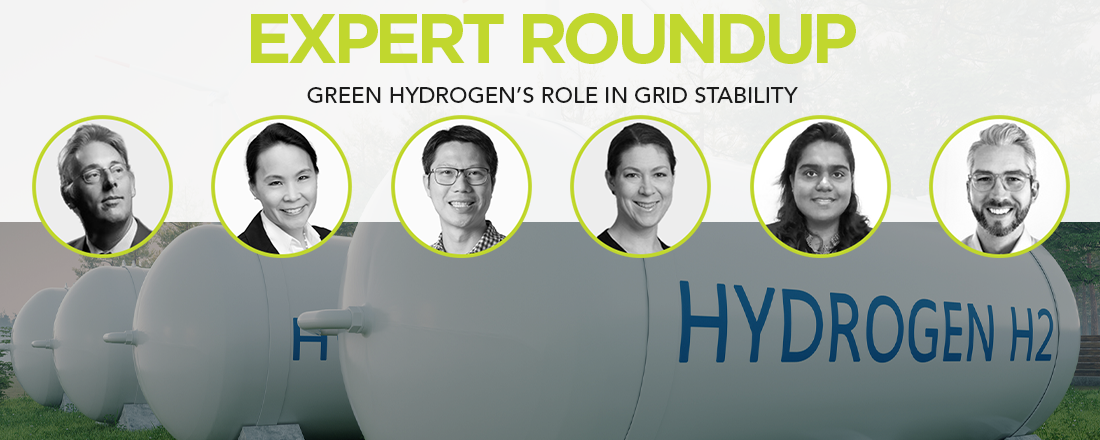
Green hydrogen is hydrogen fuel that is created through renewable energy technologies. Electrolysis powered by renewable energy splits water molecules into hydrogen and oxygen, capturing and storing the hydrogen for use as a fuel. Using renewable technologies like solar makes this process completely carbon-free. Green hydrogen is one of the newest tools being considered on the path toward a carbon-free future.
We asked green hydrogen experts to address the following question: “Do you foresee green hydrogen playing a key role in grid stability in the transition to 24/7 100% renewable electricity?”. Reviewing their answers, we discovered the following key takeaways:
- Green hydrogen has the potential to play a key role in grid stabilization due to its unique capacity to store carbon-free energy for extended periods of time.
- Advancements in policy, technology, and infrastructure are necessary to make green hydrogen more viable for widespread use.

Janice Lin
President of the Green Hydrogen Coalition and
Founder and CEO of Strategen
“Grid reliability has always been achieved by using energy storage to balance electricity production with electricity demand. In the past, we relied on fossil fuel-based storage. Today, we have much cleaner alternatives such as battery storage. However, transitioning to 100% renewables requires long-duration storage for firm dispatchable power during multiday events when the wind doesn’t blow or the sky is very cloudy.
Green hydrogen is one of the few scalable means to achieve this goal and fully displace fossil fuels for power generation. As an energy carrier, green hydrogen can store mass quantities of renewable energy in the form of a fuel ⎯ a renewable fuel that can be used to generate power and displace fossil fuels in many other applications and sectors. Green hydrogen can not only provide seasonal energy storage to displace natural gas, but more importantly, it can be used in the same equipment and infrastructure that we currently use today. It means that green hydrogen can help facilitate an affordable energy transition.”

Stephen Lamm
Director of Sustainability at Bloom Energy
“Green hydrogen is essential for grid stability in the transition to 24/7 100% renewable electricity. The grid is a multidimensional system, requiring a balance of electricity supply and demand. As renewable penetration increases, we lose some continuity on the supply side, particularly seasonally. Energy storage is then required to balance the grid. Green hydrogen is an exciting storage medium because of its ability to be stored in very large quantities for long durations (months, not hours) and be moved over long distances. The flexibility that green hydrogen provides will be critical to the design and operation of advanced power systems of the future.”

Alex Yip
Associate Professor, Department of Chemical and Process Engineering at the University of Canterbury
“Green hydrogen is a relatively new good and has the potential to create an entirely new economic sector. Less than 1% of the hydrogen produced worldwide today is “green,” or created predominantly by using wind and solar power. To satisfy the demand for green hydrogen, we need additional pathways of production. The capacity of hydrogen produced from biomass is easier to forecast and design because biomass resources are reliable and predictable. We must radically change our hydrogen production by enhancing hydrogen yield from renewable woody biomass paired with CO2 capture, reuse, and mineralization. Assuming enough green hydrogen is generated from various renewable sources, I foresee green hydrogen playing a key role in grid stability in the transition to 24/7 100% renewable electricity.”

Professor Ad van Wijk
Professor of Future Energy Systems at TU Delft

“Hydrogen will play an important role in balancing renewable intermittent electricity production, electricity demand, and grid stability. Hydrogen is a cost-effective way to store energy in large quantities for long periods of time and can complement battery storage. But even more important is that fuel cell technology can provide very flexible and cost-effective electricity to the grid. These fuel cells can be installed in buildings or in neighborhoods, where they can also provide heat. Fuel cells in cars, vans, trucks, buses, and boats can provide flexible power to the grid, with the advantage that the hydrogen can be supplied independently from the electricity grid.”

Nupur Shah
Founder of SustainBhoomi Renewable & EV Consultancy
Policy & Regulatory Expert with Masters in Green Technology
“Green hydrogen adoption will play a vital role in increasing renewable adoption and will provide grid-balancing services. It will improve the return on investment on renewable assets. Fluctuations in energy supply and demand can cause grid instability. Green hydrogen provides the option for long-term storage, which can help balance the difference between energy supply and demand. Green hydrogen can be produced and stored during times of low demand and can be deployed during times of high demand. Improvements are needed to make green hydrogen more economically viable, including technological advancements, a robust hydrogen infrastructure, a conducive hydrogen policy, and introduction of subsidies and rebates from the government.”

Elizabeth Crouse
Tax Partner & Co-Lead of Power, K&L Gates
Co-Director, Seattle Chapter of Women of Renewable Industries and Sustainable Energy
“Yes, eventually. While natural gas is a solution for grid stability right now, the grid ultimately must transition to an alternative power source that is stable and efficient for long-term storage and long-distance transport and that can function as a commodity in applications other than power. Hydrogen is generally well suited for these goals. While it’s true that producing green hydrogen and then converting it back to electricity isn’t the most efficient process, it has the benefit of having completely green inputs and outputs without the need for sequestration or utilization of carbon or the potential for other contaminants. The question is when will we achieve the cost efficiencies and demand for green hydrogen to reach the price point needed to become pervasive in the power and other industries?”
This article appeared on: https://www.mcecleanenergy.org/mce-news/experts-weigh-in-on-green-hydrogens-role-in-grid-stability/